

Teacher Education. EdTech Books. How Can You Close the School Year? Six Ideas That Work for In-Person, Hybrid, and Remote Students. Schools across the northern hemisphere are approaching summer break, after almost a year and a half of disrupted learning.
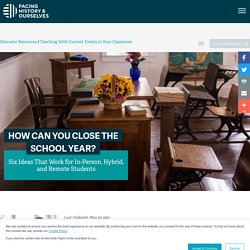
Grading. How People Learn. Literacy. Untitled. Teachers must ditch 'neuromyth' of learning styles, say scientists. Teaching children according to their individual “learning style” does not achieve better results and should be ditched by schools in favour of evidence-based practice, according to leading scientists.
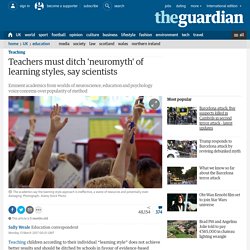
Data Equity Walk Toolkit - The Education Trust - West.
Coaching Students in Higher Education. What Is Educational Psychology? Educational psychology involves the study of how people learn, including topics such as student outcomes, the instructional process, individual differences in learning, gifted learners, and learning disabilities.
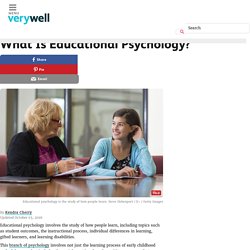
This branch of psychology involves not just the learning process of early childhood and adolescence but includes the social, emotional, and cognitive processes that are involved in learning throughout the entire lifespan. The field of educational psychology incorporates a number of other disciplines, including developmental psychology, behavioral psychology, and cognitive psychology. Topics of Interest Within Educational Psychology Educational TechnologyInstructional DesignSpecial EducationCurriculum DevelopmentOrganizational LearningGifted Learners Significant Figures in Educational Psychology History History of Educational Psychology Educational psychology is a relatively young subfield that has experienced a tremendous amount of growth in recent years.
Study finds no impact on student success from having adjunct instructors. Most of the existing research on the employment of adjunct faculty and student success shows a negative relationship, not because adjuncts are bad teachers but because their working conditions prevent them from being as effective as they could be.
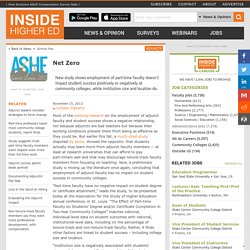
But earlier this fall, a much-cited study disputed by some, showed the opposite: that students actually may learn more from adjunct faculty members -- at least at research universities that can afford to pay part-timers well and that may discourage tenure-track faculty members from focusing on teaching. Now, a preliminary study is mixing up the literature once again, concluding that employment of adjunct faculty has no impact on student success in community colleges. “Part-time faculty have no negative impact on student degree or certificate attainment,” reads the study, to be presented today at the Association for the Study of Higher Education annual conference, in St.
How To Teach All Students To Think Critically. All first year students at the University of Technology Sydney could soon be required to take a compulsory maths course in an attempt to give them some numerical thinking skills.
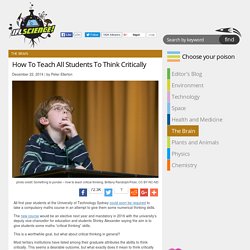
The new course would be an elective next year and mandatory in 2016 with the university’s deputy vice-chancellor for education and students Shirley Alexander saying the aim is to give students some maths “critical thinking” skills. This is a worthwhile goal, but what about critical thinking in general? Most tertiary institutions have listed among their graduate attributes the ability to think critically. This seems a desirable outcome, but what exactly does it mean to think critically and how do you get students to do it?
Reading on Teenage Brains and Stress. 80 colleges and universities announce plan for new application and new approach to preparing high school students. Eighty leading colleges and universities on Monday announced a plan to reverse a decades-long process by which colleges have -- largely through the Common Application -- made their applications increasingly similar.
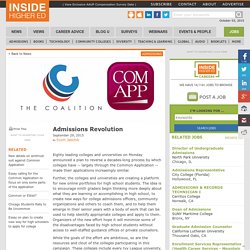
7 Things to Remember About Feedback - Eli Review. What Is College Worth? If there is one thing most Americans have been able to agree on over the years, it is that getting an education, particularly a college education, is a key to human betterment and prosperity.
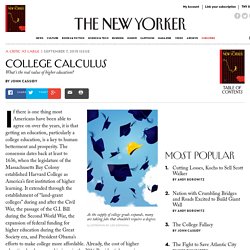
The consensus dates back at least to 1636, when the legislature of the Massachusetts Bay Colony established Harvard College as America’s first institution of higher learning. It extended through the establishment of “land-grant colleges” during and after the Civil War, the passage of the G.I. Bill during the Second World War, the expansion of federal funding for higher education during the Great Society era, and President Obama’s efforts to make college more affordable. Already, the cost of higher education has become a big issue in the 2016 Presidential campaign.
Three Democratic candidates—Hillary Clinton, Martin O’Malley, and Bernie Sanders—have offered plans to reform the student-loan program and make college more accessible. California Consequences: What If High Court Bans Race Preferences in College Admissions? Almost lost amid the recent flurry of marquee U.S.
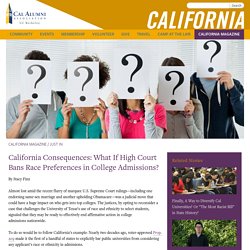
Boundless and the open educational resources movement are threatening publishers. Photograph courtesy Harvard University Department of Economics.
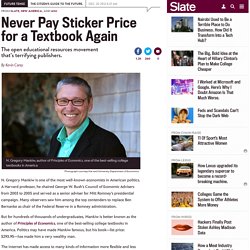
N. Gregory Mankiw is one of the most well-known economists in American politics. A Harvard professor, he chaired George W. Bush’s Council of Economic Advisers from 2003 to 2005 and served as a senior adviser for Mitt Romney’s presidential campaign. Technology won’t fix America’s neediest schools. It makes bad education worse. Education Secretary Arne Duncan has pushed for more technology in classrooms.
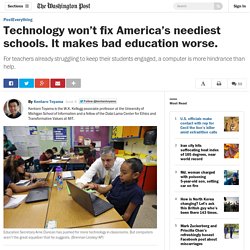
Why Ninth Grade is the Pivotal Year for Dropping Out of High School. The transition from middle school to high school is a big one, perhaps bigger than appears at first blush: Not only do students’ academic workloads increase, but simultaneously, so does their independence and responsibility. For some kids, the leap to the responsibilities of high school from what they were doing just a few months before — lining up for the cafeteria, or having parents sign their report cards — is overwhelming, especially when factoring in added freedoms and new opportunities to be social. In the case of many Chicago 14-year-olds leaving their small, familiar K-8 schools, moving up to high school can feel like entering “the Wild, Wild West,” according to University of Chicago Urban Education Institute researcher Camille Farrington.
“The Chicago K-8 schools tend to be little-kid places,” she said. “Everyone knows you and your family, all the kids are lined up, the schools tend to be small.
A veteran teacher turned coach shadows 2 students for 2 days – a sobering lesson learned. The following account comes from a veteran HS teacher who just became a Coach in her building. Because her experience is so vivid and sobering I have kept her identity anonymous. But nothing she describes is any different than my own experience in sitting in HS classes for long periods of time.
And this report of course accords fully with the results of our student surveys. Washington Post Blog Prints Heartbreaking Letter from Teacher. Yesterday, the Answer Sheet, an education blog for the Washington Post, published a heartbreaking letter from a teacher that was deeply disturbing. Susan Sluyter, the teacher in question, wrote the following letter in part: I have watched as my job requirements swung away from a focus on the children, their individual learning styles, emotional needs, and their individual families, interests and strengths to a focus on testing, assessing, and scoring young children, thereby ramping up the academic demands and pressures on them.
Each year, I have been required to spend more time attending classes and workshops to learn about new academic demands that smack of 1st and 2nd grade, instead of kindergarten and PreK.
'We Are Creating Walmarts of Higher Education' - Timothy Pratt. As colleges feel pressure to graduate more students for less money, professors worry that the value of an education may be diminished. Universities in South Dakota, Nebraska, and other states have cut the number of credits students need to graduate. A proposal in Florida would let online courses forgo the usual higher-education accreditation process.
Sebastian Thrun and Udacity: Distance learning is unsuccessful for most students. The Real Reason New College Grads Can’t Get Hired. Quality Course Framework Tutorial. Why Do Students Enroll in (But Don’t Complete) MOOC Courses? Teaching Strategies. Developing College Study Skills. Research indicates that successful learners have developed several skills and attitudes to help them study more effectively. Western Nevada College and the WNC Counseling Department encourage all students to take CAPS 122, the college study skills course. Basicskills.edublogs.org/files/2008/06/doing-20away-20with-20-27study-20skills-27.pdf.
Exercise and the Ever-Smarter Human Brain. For Advice, Ideas and Support, More Educators Seek Social Networks. Accrediting agency under federal pressure to be tougher on community colleges. High School Daze: The Perils Of Sacrificing Sleep For Late-Night Studying : Shots - Health Blog. Colleges Awakening to the Opportunities of Data Mining.